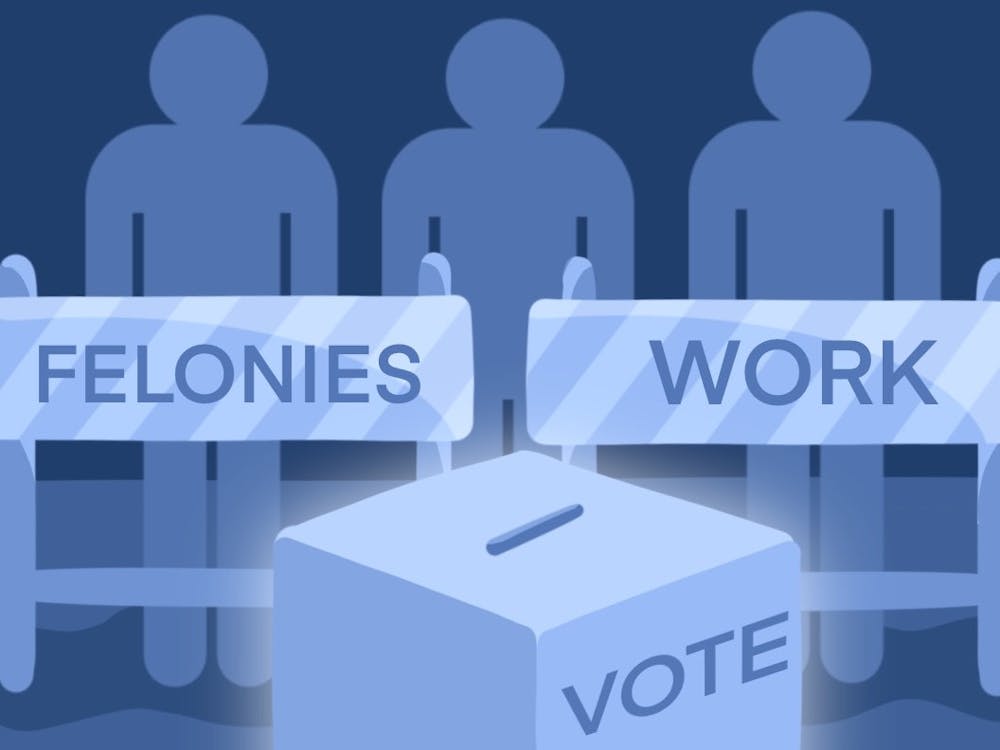Shenita Blunt is concerned about the level of engagement from candidates toward the Black community in the city.
The 55-year-old Gainesville resident and frequent voter said those running for political office should do a better job in fulfilling a fundamental task: letting the historically marginalized know their vote counts.
“I’m here. Let me hear your voice,” Blunt said in reference to the message she believes candidates should convey. “Let me know what it is that you want, so we can work as a team to make it happen.”
In the absence of such engagement, Blunt argues, marginalized voters won’t feel compelled to participate in the electoral process.
“They don’t think that anybody gonna hear them,” she said. “‘Why am I talking? They don’t come to our communities.’”
As the 2022 midterm general election grows near, data reveals racial disparities in Alachua County voter turnout. Limitations like suppressive voting laws and confusion surrounding the rights of those with felony convictions present further barriers across the state.
For the 2020 general election, white voter turnout was about 78% while the figure was about 68% for Black voters in Alachua County, according to the county’s Supervisor of Elections Office data.
Nationally, nearly 71% of white voters made their way to the polls while the figure was more than 62% for Black voters and around 58% for all minorities, according to the Brennan Center for Justice. Black voters constitute about 17% of those registered in the county despite being about 21% of the county’s population.
Similar racial gaps in turnout can be seen in other recent elections. In the 2018 midterm election, about 59% of Black voters made their way to the polls while about 67% of white voters did in Alachua County, according to the county’s Supervisor of Elections Office data.
In April 2021, Republican legislators in Florida passed a voting bill critics argued imposed harsh limitations on voters. The law limits ballot collections and drop offs, makes voters request absentee ballots for elections rather than receiving them automatically and limits so-called line warming activities — such as food provided by groups within a radius of 150 feet from the voting location. Earlier this year, Florida passed another bill to establish an anti-voter fraud law enforcement body. The legislation forms an Office of Election Crimes and Security with the purpose of investigating potential voting crimes.
Jamil Davis, Florida’s state organizing manager for Black Voters Matter, said he believes laws like that can have a psychological effect on voters in deciding whether to go to the polls. For the average voter, he fears such a force can serve as a deterrent to exercising their right to vote.
“It now puts me in a space of ‘will I even be arrested just for showing up to go vote?’” he said.
Earlier this year, District Judge Mark Walker ruled against provisions — including voting dropbox limitations — of a 2021 law known as Senate Bill 90 on the basis they were racially discriminatory. In his ruling, Walker outlined Florida’s sordid history of racial discrimination with a 1920 lynching of a Black man who attempted to vote to 21st century voter roll purges.
However, the 11th Circuit Court of Appeals sided with the state.
Cecile Scoon, president of the League of Women Voters of Florida — one plaintiff in the case against SB 90 — said concerns about the impact of current and historical injustices keep some voters away from the polls.
“All of those sort of present-day differences in treatment and historical, intentional discrimination have flowed together so that a lot of people, Black and brown people, low-income people,” she said. “They feel like they don’t count, they can’t be seen, and they’re going to be treated unfairly.”
When voters are made aware of the connection between the people elected to office and the decisions they make that impact them, they’re more willing to participate in the electoral process, Scoon said.
Another potential obstacle facing some Florida voters lies in the path of convicted felons looking to head to the polls. In 2018, about two-thirds of voters in the state approved an amendment to allow many convicted felons — not including those convicted of serious offenses such as murder and sexual assault — to vote once they’ve completed their sentences.
However, the Florida Legislature approved a law to make felons pay pending fines before they can vote. Despite the state’s role in ensuring those who register are actually eligible, those with felony convictions can’t always verify whether they have outstanding payments.
Another problem is some felons are unaware that the nature of their crimes affect whether they can register. They aren’t informed on the fact the change in Florida’s law doesn’t apply to sex offenders or those with murder convictions.
This gap in knowledge contributed to voter fraud charges against 20 convicted felons who voted in August despite being ineligible to do so due to the nature of their offenses. Those charged and arrested could potentially be penalized with a $5,000 fine and a prison sentence of up to five years.
Combating a lack of knowledge about election matters and voter apathy are two other challenges in getting community members out to the polls.
Blunt said she believes first impressions at the polls, along with knowledge of what’s on the ballot, are critical leading up to the election.
She wants to see more engagement from candidates in local neighborhoods to keep community members informed. She suggested candidates reserve spots at local libraries or churches for outreach purposes.
Ivanna Gonzalez, the director of campaigns for Florida Rising, said she believes it’s important to make voters understand that casting a ballot is simply the beginning of the process to bring about reform.
“I think it’s just really helpful to combat the traditional idea that you can change the world with voting, because the message is actually it starts with voting,” she said. “We get to decide who is going to be our partner or our opponent when we continue to do the work after election day.”
Contact Omar at oateyah@alligator.org. Follow him on Twitter @OAteyah.

Omar Ateyah is a third-year journalism student and the Alligator's Race and Equity reporter. He previously served as the Alligator's crime reporter and as a news assistant on the Metro Desk. He enjoys going on long, thoughtful walks.






